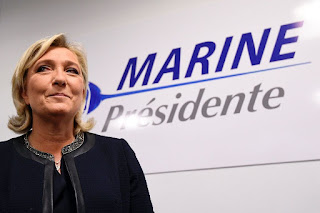France will determine who will carry on as its next president next year and one candidate is in the heat of ring with her anti-immigration reforms agenda, and her popularity gradually increasing since she last contested the presidency election.
Meet Marine Le Pen
Born 5 August 1968 a French politician who is the president of the National Front (FN), a national-conservative political party in France and one of its main political forces. An attorney by profession, she is the youngest daughter of longtime FN leader Jean-Marie Le Pen. She is the aunt of Marion Maréchal-Le Pen.
Le Pen joined the National Front in 1986 and has been elected as a regional councillor (1998–present), a Member of European Parliament (2004–present), and a municipal councillor in Hénin-Beaumont (2008-2011). She was a candidate for the leadership of the FN in 2011 and won with 67.65% (11,546 votes) of the vote, defeating her opponent Bruno Gollnisch and succeeding her father Jean-Marie Le Pen, president of the party for nearly forty years. She then became the second president of the party.
The next year, she placed third in the presidential election with 17.90% of the vote, behind François Hollande and Nicolas Sarkozy.
Described as more democratic and republican than her nationalist father, she has led a movement of "de-demonization of the Front National" to detoxify it and soften its image, based on renovated positions and renewed teams, also expelling controversial members accused of racism, antisemitism, neo-Nazism, or pétainism including her father. An important moment was when she said that the Holocaust was the "height of barbarism" while her father had famously said it has been "a detail in the history of World War II". She has also relaxed some political positions of the party, advocating for civil unions for same-sex couples instead of her party's previous opposition to legal recognition of same-sex partnerships.
Le Pen was ranked among the most influential people in 2011 and 2015 by the Time 100. In 2016, she was ranked as second-most influential MEP in the European Parliament by Politico, just behind the President of the European Parliament Martin Schulz.
The
French will hold the first-round vote in April for a president who
enjoys even greater executive powers than the US commander-in-chief,
including the authority to send the country to war without parliamentary
approval.
Polls
currently show Le Pen making it past the first round to the May 7
run-off, where she is expected to face off against a conservative
candidate from the centre-right.
While
the country's two-round electoral system makes it difficult for
outsiders to cause an upset, observers believe that the Trump and Brexit
earthquakes have shown that old certainties can no longer be relied on.
Le
Pen, who is currently polling at around 25-28 percent, has gleefully
seized on Trump's win as proof that nothing is "set in stone".
Trump "made possible what had previously been presented as impossible," she said in a recent BBC interview.
She
was among the first European politicians to congratulate the Republican
on his win last week and has praised his opposition to free trade,
globalisation and the "warlike interventions that are the source of the
huge migratory waves that we are suffering".
In
Berlin, Valls pleaded for a new approach to globalisation to respond to
the kind of "anger" that led to the Brexit decision and the US election
result.
"I am for a globalisation that serves the people," he said.
His
comments echoed those of US President Barack Obama, who was also in
Berlin on Thursday as part of a European farewell tour aimed in part at
reassuring allies about transatlantic ties under Trump.
In
a speech in Athens on Wednesday, Obama acknowledged that globalisation
had fuelled a "sense of injustice" and needed a "course correction" to
address growing inequality.


No comments:
Post a Comment